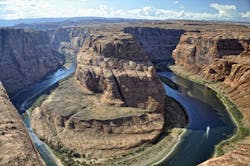Groundwater recharge in Upper Colorado River Basin may hold steady under climate change
WASHINGTON, DC, AUGUST 15, 2016 -- Future increases in precipitation in the Upper Colorado River Basin may increase groundwater recharge, offsetting reductions that would result from increased temperatures, according to a recent study by the U.S. Geological Survey and Bureau of Reclamation.
The Colorado River provides water for more than 35 million people in the United States and 3 million people in Mexico. A recent USGS publication suggests that as much as half of the water flowing in rivers and streams in the Upper Colorado River Basin originates as groundwater. Understanding how much groundwater is available and how it’s replenished is important to sustainably manage both groundwater and surface water supplies in the Colorado River basin now and in the future.
USGS and Reclamation scientists estimated projected changes in groundwater recharge for the Upper Colorado River Basin from recent historical (1950–2015) through future (2016–2099) time periods using climate projections and a groundwater-recharge model. Simulated future groundwater recharge through 2099 is generally expected to be somewhat greater than the historical average in most decades due to an anticipated wetter future climate in the basin under the most advanced climate modeling projections. Groundwater resources are replenished through increases in precipitation, which may offset reductions from increased temperatures. The full report is available online in the journal Geophysical Research Letters.
While recharge simulations from a majority of the projected climate data sets result in increased recharge in the Upper Colorado River Basin during most future decades, there were some that resulted in decreased future recharge relative to the historical climate period.
"You can’t manage what you don’t measure," said Fred Tillman, lead author and USGS scientist. "These results are the first step in understanding the quantity of groundwater we can expect in the Upper Colorado River Basin; however, further studies are needed to help more accurately forecast future groundwater availability."
"Future estimates of groundwater recharge are compounded by the large-scale of the Upper Colorado River Basin and the uncertainties of future climate projections," said Reclamation co-author Subhrendu Gangopadhyay.
"Given these uncertainties, multiple-future water supplies scenarios are used to inform Reclamation’s water management and planning within the Upper Colorado River Basin," Reclamation's Upper Colorado Region Water Resources Manager Malcolm Wilson added.
This study was completed with support from Reclamation’s Science and Technology Program to help meet objectives of the SECURE Water Act, which was created by Congress in 2009 as a framework for a programmatic approach to understand climate change impacts, and to develop adaptation and mitigation strategies. This act contains substantive mandates for both the USGS and Reclamation to help provide a more accurate assessment of the status of the water resources of the United States and assess the potential impacts of climate change on water management.
